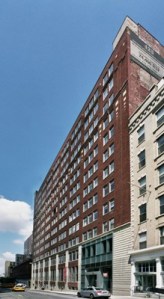Having spent time working with ownership groups that operated like Real Estate Investment Trusts, working for The Winter Organization has been a welcome change for Robert Fink, who joined the group four years ago.
“Real estate is a long-term investment, but when you become a REIT and you’re now issuing stock to the public, everyone is looking quarter-to-quarter,” said Mr. Fink, director of leasing at the firm, in an interview with The Commercial Observer. “Those [are] counteracting forces that sometimes lead to not make the best real estate decisions.”

For the Winter Organization, a 100-year-old family business run by brothers Benjamin and James Winter, the ownership group looks to own its properties for periods longer than the 7-to-9 year period that has become popular with REITs.
That could explain the Winter Organization’s slim vacancy rate, which currently stands at an estimated 2.5 percent for its entire portfolio. It helps Mr. Fink, who is the firm’s director of leasing, to let tenants up for renewal know that a Winter Organization-owned building won’t be flipped for a profit the year after they sign new leases.
“I can go into a meeting with tenants and say with conviction ‘we are long-term owners,’” said Mr. Fink.
The company also prefers to develop its properties selectively, especially when it takes C-class buildings with the aim of converting them into B-plus properties
One such property, a former warehouse on 423 West 55th Street, is testament to that.
“They don’t do a lot of development,” said Mr. Fink. “But when they do, it certainly has the vision like they did with [423 West 55th] Street.”
When the building was purchased by the Winter Organization in December 2002, it was “a quasi-warehouse” style of building located on the outskirts of the Midtown business area.
The firm decided to reposition 423 West 55th Street, embarking on a series of cosmetic (and in some instances, radical) alterations to make the property more inviting.
The lobby of the building was repositioned, and was moved from the west side to the east side of the building. The entrance to the lobby, which previously had steps leading up to it, had been lowered to make it more ADA accessible
The facade on the east of the building had also been re-done.
“It was pretty much a gut renovation,” said Stephen Schofel, an executive managing director at Newmark (NMRK) Knight Frank who handles leasing at the asset.


